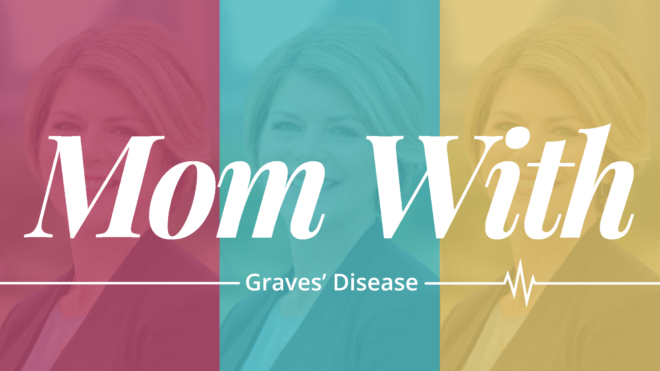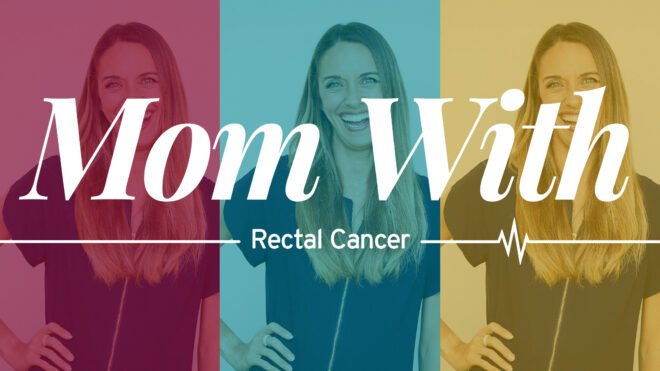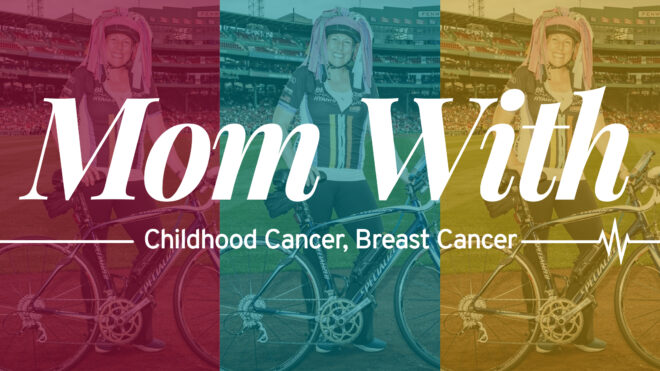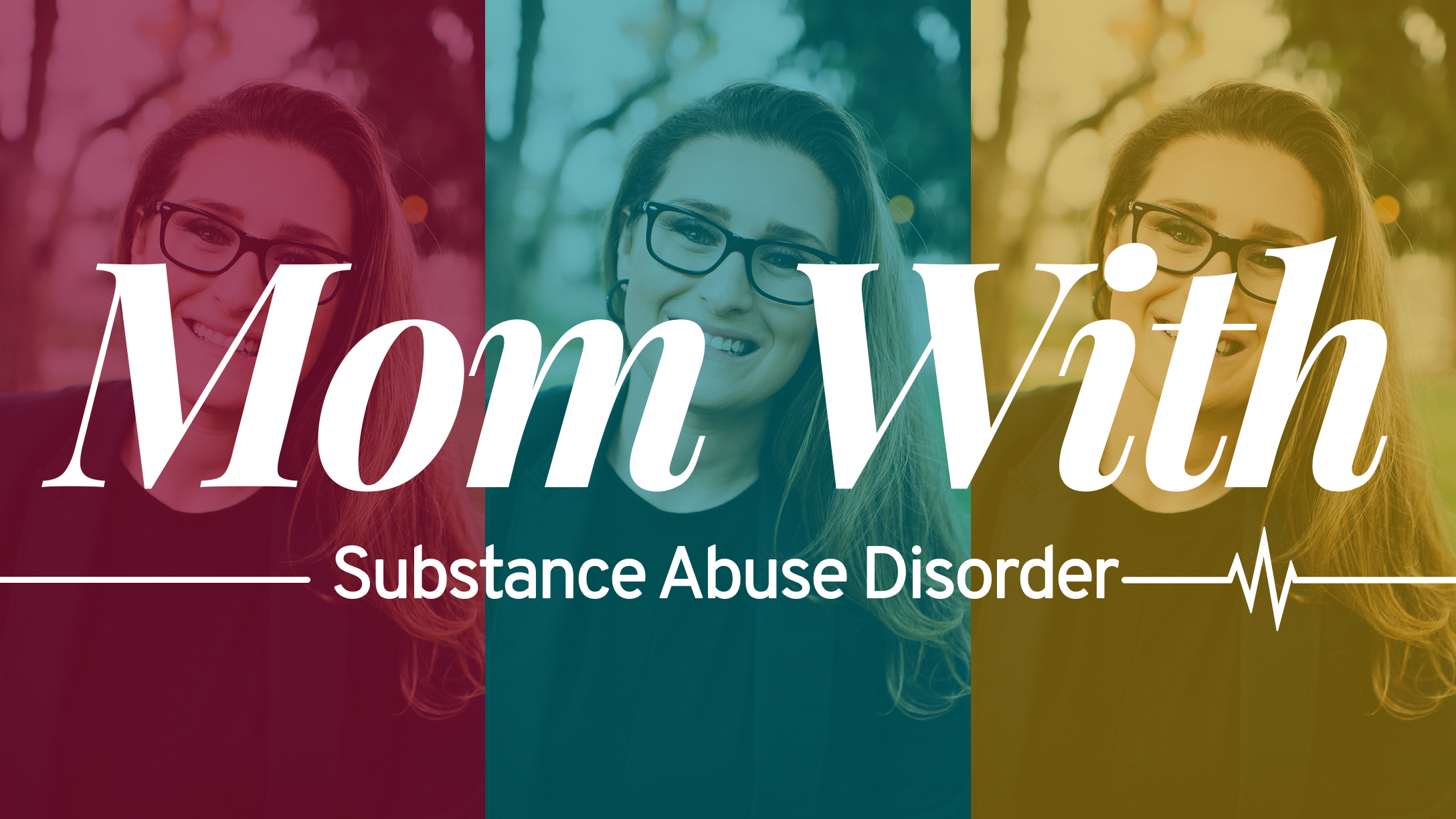
On January 7, 2006, Ashley Loeb Blassingame made a decision that would shape the rest of her life. At 19 years old, she decided enough was enough. She needed to get sober.
“I had landed in the hospital after trying to 'just drink' and not do drugs. The veins in my arms were infected. I remember looking up at the ceiling and then the look on my mother's face and thinking, 'I have given my entire childhood to trying to make this work. It's not working. It's over.' And indeed, it was."
At 7 years old, Ashley had moved across country and did not feel comfortable in her skin.
"I felt like I was born with it on too tight,” says Ashley. She didn’t fit in with her peers and everything seemed out of control. She was looking for an escape from reality.
“Substances gave me a break from the constant chatter in my head and the feelings that went along with being me," Ashley adds. "I like to say that I hired substances to do a job for me and then over the course of years, they stopped working. They didn't help me escape my realities and the ones they had helped create grew worse by the day. I found myself simultaneously unable to live with substances and unable to live without them. I often hoped for death to come find me so that I would be freed from having to trudge my way out, but I kept experiencing ever more debilitating near-misses instead. A lot of people get clean and sober to avoid death, but I was afraid that I was going to go on living that way.”
Substance use disorder is a condition often implicated as a form of "coping" when the means or skills to cope otherwise don’t readily appear available to the individual.
“Substance use disorder is often miscategorized to imply that it is a choice one makes,” says Dr. Bronwyn Huggins, clinical assistant professor in the Department of Psychiatry at NYU Langone Health and psychiatrist for women’s mental health in the Adult Outpatient Psychiatry Clinic at NYC Health + Hospitals/Bellevue.
"Post and peripartum substance use disorder (SUD) is its own distinct entity," Huggins adds, "in part because we know that it is a time defined by psychological adjustments that encompass the physical and emotional impact of motherhood.”
Now 15 years sober, Ashley is mother to 4-year-old twin boys, Davis and Jackson, and is using her experience to help others.
She is Chief People Officer and Co-Founder of a health-tech company called Lionrock Recovery. It helps treat substance use disorder using video conferencing technology. Ashley is also the host of a podcast about recovering from adversity called The Courage to Change: A Recovery Podcast.
But the difficulties of her past remain challenging. Though now living completely clean, Ashely struggles with depression and anxiety.
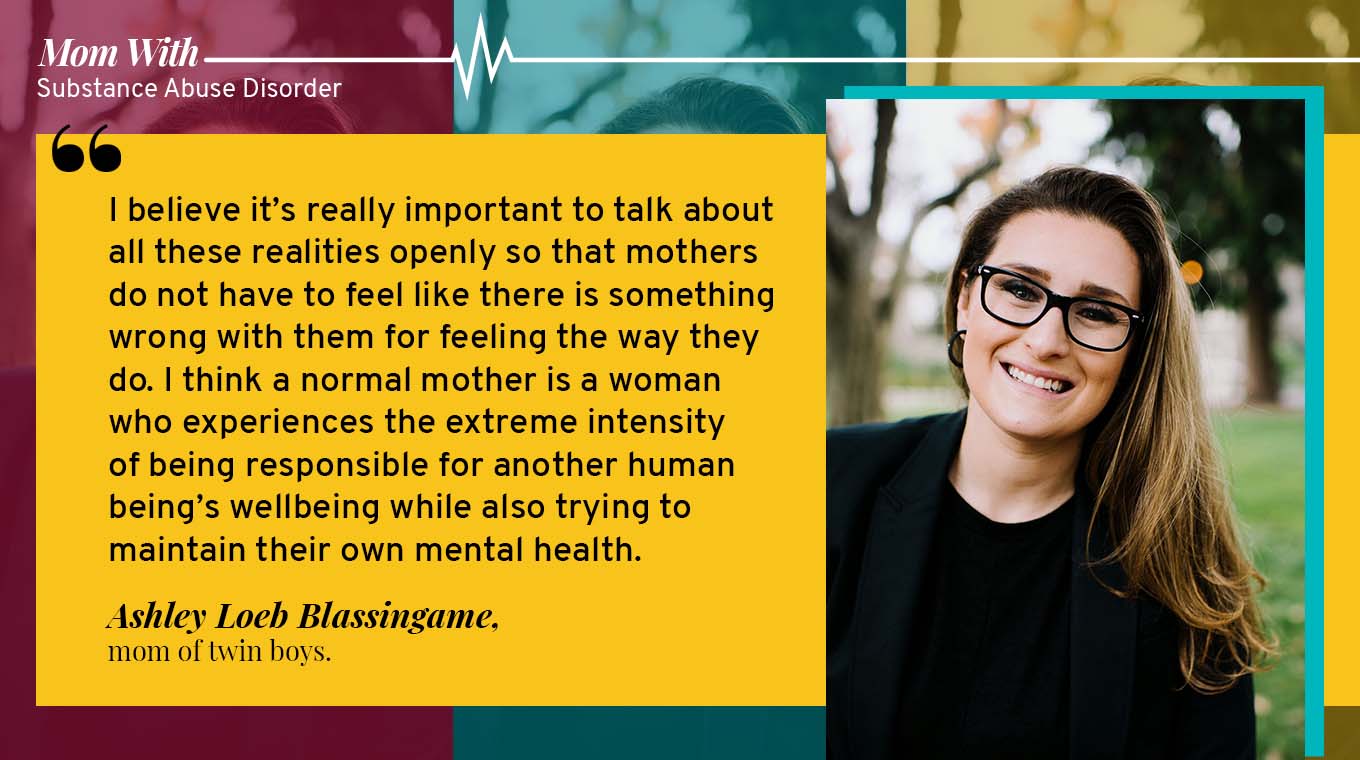
“Drugs and alcohol were symptoms of a greater problem," details Ashley. "When I removed them, I rediscovered the depression and anxiety that I had been battling for many years. Getting sober at 19 allowed me to explore different ways of getting well and living in recovery. If I needed a yoga class or a 12-step meeting to get out of my head, I would just go to one. I didn’t need to worry about anyone else’s schedule or needs.”
As Ashley pointed out, her issues with drugs and alcohol were part of a much bigger problem.
This is unfortunately all too common when it comes to those who suffer with SUD.
“There is a growing prevalence of substance use and co-morbid psychiatric illness, including mood and anxiety disorders” says Huggins. “Substances are often used to ‘self-medicate’ or may act as a form of avoidance, in order to minimize unwanted affective states like depression, anxiety, and the sequelae of past trauma. Because coexisting disorders have a greater incidence of adverse health outcomes, what has been shown to be helpful is the treatment of co-existing psychiatric illness, such as anxiety and insomnia, during the peripartum. Women should consider the addition of medication use under the direction of a medically, trained prescriber if doing so can reduce the greatest risk of relapse and sustained, long-term benefit for mother and child.”
At 30 years old and 11 years sober, Ashley gave birth to fraternal twin boys.
From that moment, everything changed. She had spent 11 years putting self-care for her mental health first and then suddenly, it was last.
“While I loved my children with every part of my being, the depression and anxiety were enormous. My body, let alone my time, was not my own," say Ashley. "I now call it my 'postpartum recovery.' It does not look the same as it used to because it cannot. I have had to stumble and figure out how to take care of myself as both a mother and a person in long-term recovery.”
Being a mom is a full-time job.
It’s the most wonderful job in the world, but also the most challenging. For mothers who suffer from SUD, anxiety or depression, the job of being a mother can sometimes feel overbearing and these issues have a way of creeping into motherhood.
“I have some shame in writing this, but the truth is that it does affect me as a mother more than I expected," Ashley reveals. "Motherhood is the most demanding experience I have ever had and when I burn out, my depression creeps in and disguises itself as 'normal motherhood exhaustion.' People give me a 'pass' because I have twins or young kids. The truth is that my depression makes it so that no amount of sleep will give me energy. It becomes impossible for me to recharge. Everything is just another thing on the to-do list, even things that are supposed to be fun. Moments with my children that I know are supposed to be precious are passing me by like a movie of someone else’s life because I am numb. These are the types of things that I have experienced that were caused by depression. I know that my boys are not getting the mother they deserve and the one I want to be when I am in this state.”
It requires constant effort to stay focused.
“A good day as a mother struggling with depression, anxiety, and PTSD is one where I do some sort of self-care act that brings me energy that I can share with my boys," says Ashley. "This often looks like me going to a yoga class first thing in the morning before they wake up and then participating in a support group meeting, usually online, sometime in the day. The exercise provides physical benefits, and the support group provides mental ones.”
Huggins confirms that Ashley’s method for a good day has its benefits. “Generally speaking, SUD requires a multifaceted treatment approach," she says. "We always try to maximize all forms of non-pharmacological modalities, if and when possible. This includes lifestyle modifications, stress-reduction, and often healthy practices that promote physical and mental well-being.”
But that doesn't mean it's always sunshine and rainbows.
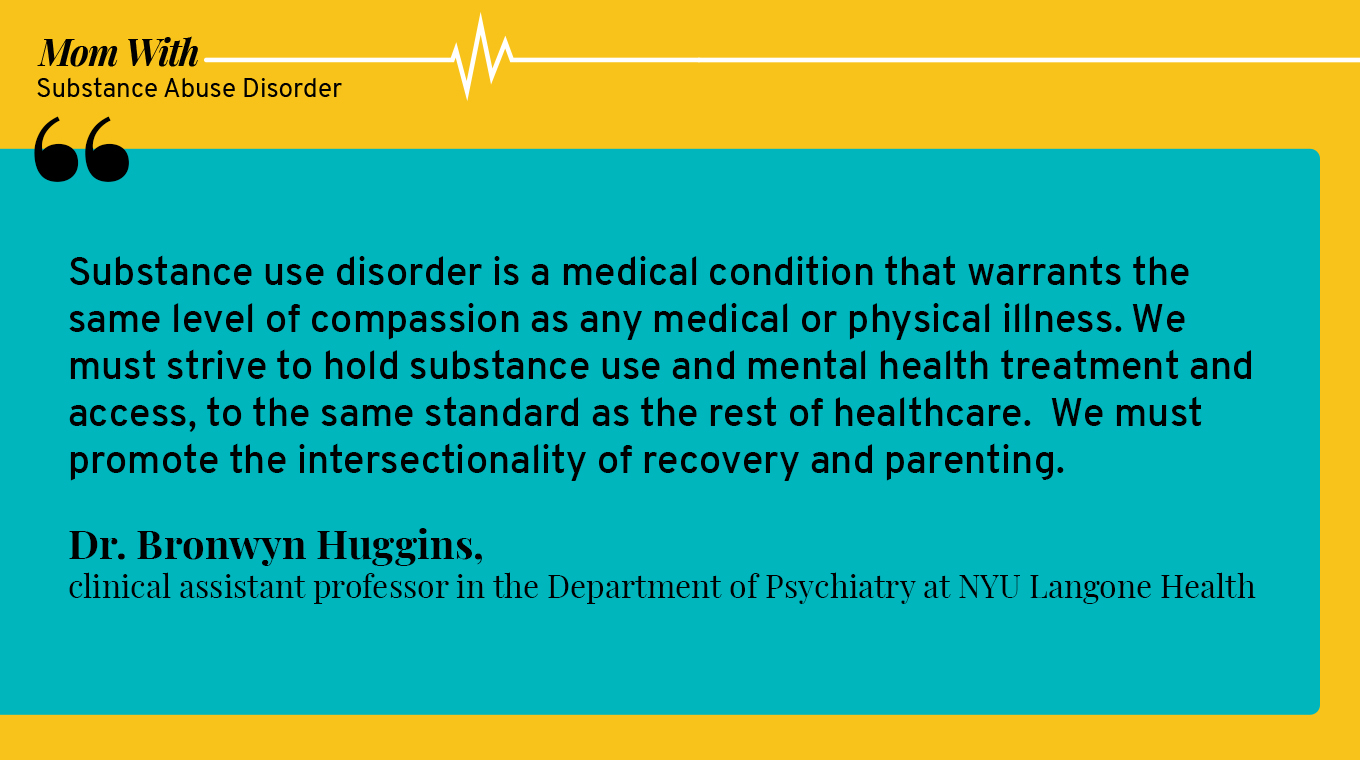
“A bad day usually starts out with me being jolted out of bed, having not slept enough hours," Ashley reveals. "I am moving through the motions of our routine but nothing about me is present. Every chance I get, I lay down because I am so exhausted that I physically feel discomfort from it. I am short with my kids and begin counting down the hours until bedtime so I can lay down again. All I want is to go back to bed, but with depression, there is not enough sleep to actually give you energy. It’s just perpetual exhaustion.”
Lately there has been more talk about mothers who struggle with various mental illnesses, but there is still a stigma surrounding this, especially when it comes to sharing your troubles with your children.
“My children definitely know that I have struggled with something, but we have not talked about it as it relates to depression, anxiety, and PTSD, specifically," details Ashley. "I went to a wellness, nutritional support center for 30 days to help with depression that was getting unmanageable with my default coping skills and nutrition. This was an extremely difficult decision for me, but I knew that I could not be the best mother for my boys if I did not recalibrate.
“This has forced me to have some conversations about where I went and what I did there which I have discussed in age-appropriate language with them. Mostly we talk about how certain foods make 'mommy feel really bad' and that I have to take care of myself so I can take care of them. It can be very painful to stay committed to my self-care, especially when it makes the kids upset because they want something from me at that moment that is competing with what I need.”
Ultimately, Ashley wants people to understand that there is no shame in being a mother who suffers from an illness, whether mental or physical.
As Huggins points out, compassion is what we need. “Substance use disorder is a medical condition that warrants the same level of compassion as any medical or physical illness," she says. "We must strive to hold substance use and mental health treatment and access, to the same standard as the rest of healthcare. We must promote the intersectionality of recovery and parenting.”
All mothers deal with motherhood in their own way and that is exactly what Ashley is trying to do.
“I want people to know that being a mother with depression, anxiety, and PTSD adds a layer of challenge to being a mother that not everyone experiences and that those of us who do experience it would appreciate your compassion," says Ashley. "A mother with mental health struggles loves her children as much as one without them. Please remember that when you have the urge to cast judgment.”
There is no such thing as being a perfect or normal mother, but rather just being a mother. We need to be real, revealing, and supportive.
“I believe it’s really important to talk about all these realities openly so that mothers do not have to feel like there is something wrong with them for feeling the way they do," says Ashley about what is likely to help other mothers who are struggling. "I think a normal mother is a woman who experiences the extreme intensity of being responsible for another human being’s well-being while also trying to maintain their own mental health.
“I like to define myself with the actions I take in the face of my mental health struggles rather than the struggles themselves. For example, I am a person that likes to hike and do yoga. While those activities are related to how I treat my struggles with depression, I do not define myself by the struggle. I am defining myself by the action I take to combat it.”

